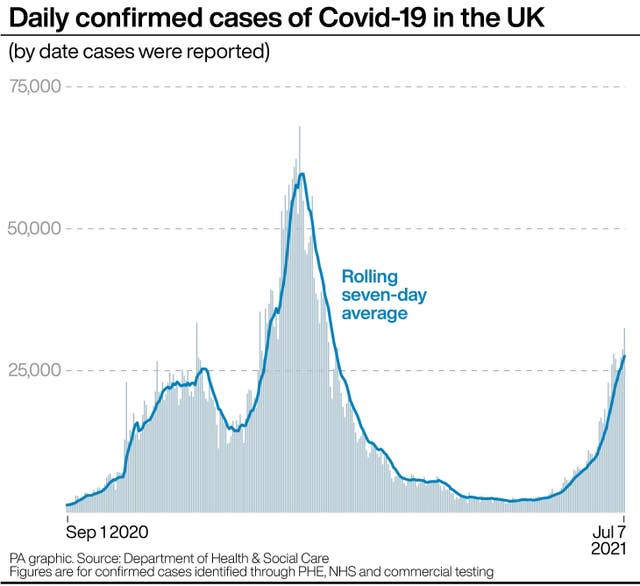WHO advises caution over mass gatherings to avoid ‘disrupting gains made’
Mass gatherings should be carefully thought about as Covid-19 restrictions are eased or “many people will look back with many regrets”, it has been suggested.
The World Health Organisation (WHO) said governments should be careful not to “disrupt gains made”.
The comments came as England were preparing to play Denmark in the semi-final of Euro 2020 in front of a 60,000-strong crowd at Wembley stadium in London.
At a briefing on Wednesday, members of WHO were asked about mass gatherings and changes to coronavirus restrictions in countries across Europe.
Dr Michael Ryan, executive director, WHO Health Emergencies Programme, said he would not comment on specific events or mass gatherings, but encouraged governments and individuals to think about which events were necessary, or “many people will look back with many regrets”.
He added: “Governments should be very careful and not disrupt gains made.”
Dr Maria Van Kerkhove, technical lead, WHO Emergencies Programme, said: “Fan zones and sporting events drive transmission by bringing people together.”
She added that the past week had seen a 33% increase in Covid cases across Europe.
Latest UK figures show the number of daily reported cases stood at an average of 27,557 on Wednesday July 7, up 43% on the equivalent figure a week ago.

WHO advised countries to take a “risk management” approach when lifting restrictions.
This involved looking at data on virus cases and transmission rates, avoiding too much social mixing and dealing with social and health measures appropriately.
Dr Ryan said: “The UK has has had great success with vaccination.
“Vaccination is meant to take pain, tragedy and suffering from the pandemic, but we are not there yet.”
Meanwhile, it was reported on Wednesday that the total number of reported deaths from Covid-19 had passed four million.
Sir Jeremy Farrar, director of Wellcome, said: “Today, the world passed another devastating milestone: four million reported deaths. Sadly, the true figure is undoubtedly much higher.
“These deaths were not inevitable. They are a consequence of global leaders failing throughout the pandemic to act with the urgency or the scale needed.
“In countries with widespread vaccination coverage there thankfully appears to be a weakened link between infection rates, hospitalisations and deaths.
“But for large parts of the world facing a vaccine shortfall and the highly infectious Delta variant, it’s a tragically different picture.
“We have the tools we need to end this pandemic – vaccines, treatments and tests – but this will only work when they’re available to everyone, everywhere. Recent pledges from the G7 and G20 do not go far or fast enough.
“They are the only ones that can make vaccines available now. We must do all we can to drive down transmission everywhere, save lives and reduce the chances of a new variant emerging that could overcome our vaccines and treatments.
“We’ve seen the dangerous consequences of acting too late. This must not be repeated.”


